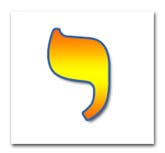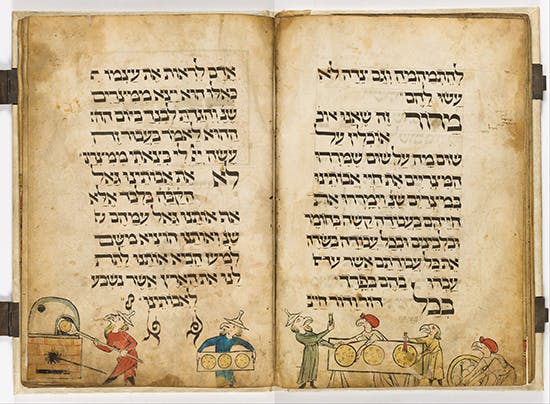A Jot or a Tittle

If you grew up reading the King James Version of the Bible, you would have read the passage above with the words “one jot or tittle.” Perhaps you learned that this was some type of punctuation mark equivalent to our English apostrophe. The “jot” that Jesus was referring to was the Hebrew letter yod. It is the smallest letter in the Hebrew alphabet, just half a line long.
The yod is often written with a small line at the top: y like a little capital “L” rotated 180o. What we translate “tittle” or “stroke of a pen” is just the small curve at the top of the letter, the slight embellishment on the yod. It was called “the thorn of the yod.”
So what Jesus was saying was, “Not the smallest letter or even a decoration on the smallest letter will disappear.” This is actually a well-known Hebrew expression, “lo yod v’lo kotso shel yod.” It means “not a yod or a thorn of a yod,” or “not the most insignificant or unimportant thing.”
A story was told by another rabbi after Jesus’s time that appears to illustrate what this means:
When God gave the Torah (Gen.–Deut.), He said, “The king, moreover, must not acquire great numbers of horses for himself…He must not take many wives, or his heart will be led astray. He must not accumulate large amounts of silver and gold” (Deuteronomy 17:16–17, NIV). But instead, King Solomon had many wives and horses, and much gold. When that happened, the letter yod ascended to God’s throne and humbly said to the Lord, “Didn’t you say that no letter should ever be abolished from the Torah? Today Solomon has abolished the word ‘not’ from this law, and perhaps tomorrow he will abolish the whole thing! God responded: “Solomon and a thousand like him will pass away, but the smallest tittle will not be cancelled from you.”
This parable gives us some insight into Jesus’s words. Solomon was living as if Deuteronomy 17 didn’t have the word “not” in it, and as if God had commanded the opposite—that the king should acquire many wives and as much wealth as possible! But no matter how much Solomon ignored the law, God’s commands could not be cancelled. Many people in our world today believe that we can live our lives as if God doesn’t exist and that the rules are ours to make. But this lesson tells us that the final standard by which we must live is God’s Word, not our own.
More articles and books are available at www.en-gedi.org
Related Resources

Discover Your Purpose and God’s Heart For You
In today's divided, turbulent world, it's essential for the Church to rediscover God's heart. Our free e-book, authored by a seasoned expert with three decades of experience in Israel, delves deep into the teachings of Jesus (Yeshua) to reveal God’s principles of love and purpose. Learn how embracing these truths can bring significance and impact to your life, even amidst chaos. Subscribe now to receive your free copy and embark on a journey of transformation.




